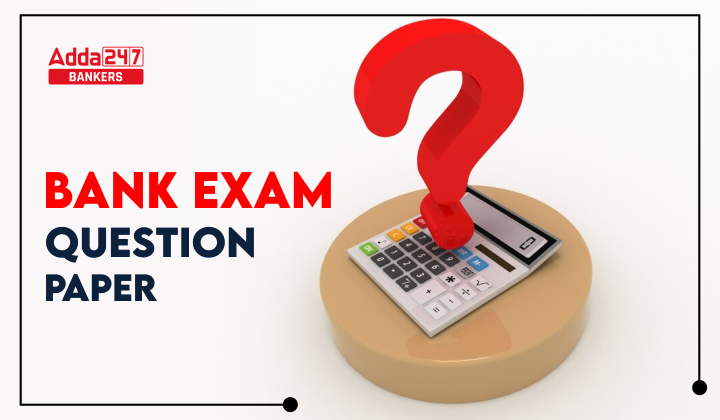Table of Contents
Bank Exam Question Paper
Bank Exams are not just assessments of knowledge but are opportunities to showcase your abilities understanding, critical thinking and problem-solving skills. Bank exams serve as a medium through which banks acquire young talented professionals. In this post, we shall evaluate the art of navigating exam question papers with fineness and some of the previous years’ question papers
- Understanding the Structure: The first step in conquering bank exam question papers is understanding their structure. Most question papers are divided into sections or categories, each focusing on specific topics or subjects. Familiarize yourself with the format of the paper, including the number of questions, allocation of marks, and any instructions provided.
- Prioritizing Time Management: Time is a precious commodity during exams, and effective time management is crucial for success. Allocate an appropriate amount of time to each section based on the marks assigned and the complexity of the questions. Start with the sections you feel most confident about to build momentum and allocate sufficient time for revising and reviewing your answers towards the end.
- Analyzing Questions: Once you’ve familiarized yourself with the structure and instructions, analyze the questions systematically. Read each question attentively, identifying key concepts, keywords, and requirements. Break down complex questions into manageable parts, ensuring a comprehensive understanding of what is being asked before formulating your response.
- Applying Strategic Approaches: Different types of questions may require different strategic approaches. For objective questions such as multiple choice or true/false, eliminate incorrect options before making your selection. For subjective questions, such as essays or case studies, organize your thoughts coherently, provide relevant examples or evidence to support your arguments, and adhere to any specified structure or format.
- Understand the Instructions: Before diving into the questions, carefully read and decipher the instructions provided. Pay close attention to any specific guidelines regarding formatting, word limits, or calculation methods. Misinterpreting instructions can lead to unnecessary errors and deductions, so ensure clarity before proceeding.
- Reviewing and Revising: Once you’ve completed all the questions, resist the temptation to submit your paper immediately. Use any remaining time to review your answers systematically. Check for errors in calculation, clarity of expression, and coherence of arguments. Make any necessary revisions or additions to strengthen your responses and ensure accuracy.
Successfully navigating exam question papers requires a combination of preparation, strategic thinking, and effective time management. By understanding the structure, deciphering instructions, analyzing questions, applying strategic approaches, and reviewing your answers meticulously, you can maximize your chances of success and achieve your academic goals. Remember, exams are not just tests of knowledge; they are opportunities to demonstrate your capabilities and shine bright amidst challenges.
Bank Previous Years’ Question Papers
Bank Previous years’ question papers serve as invaluable resources for exam preparation. They provide insight into the format, structure, and types of questions that may appear in upcoming exams. By reviewing past papers, students can familiarize themselves with the exam pattern, identify recurring topics or concepts, and gauge the level of difficulty expected. Additionally, solving previous year’s question papers allows students to assess their strengths and weaknesses, refine their time management skills, and practice effective exam strategies. Overall, incorporating past papers into study routines can significantly enhance preparation and boost confidence levels when approaching examinations.
Benefits of Solving Bank Exam Previous Year Question Papers
There are numerous benefits of solving Bank Exam Previous Year Question Papers. It is an invaluable practice for exam preparation, offering candidates a structured approach to revision, improving time management skills and maximising their chance of selection.
- Understand exam patterns and time management
- Effectively revise and practise key concepts
- Recognise question trends and prioritise study areas or subjects
- Identification of strengths and weaknesses for targeted preparation
- Simulate to exam conditions and reduce anxiety





 GA Capsule for SBI Clerk Mains 2025, Dow...
GA Capsule for SBI Clerk Mains 2025, Dow...
 The Hindu Review October 2022: Download ...
The Hindu Review October 2022: Download ...
 Important Days in April 2025, List of Na...
Important Days in April 2025, List of Na...




